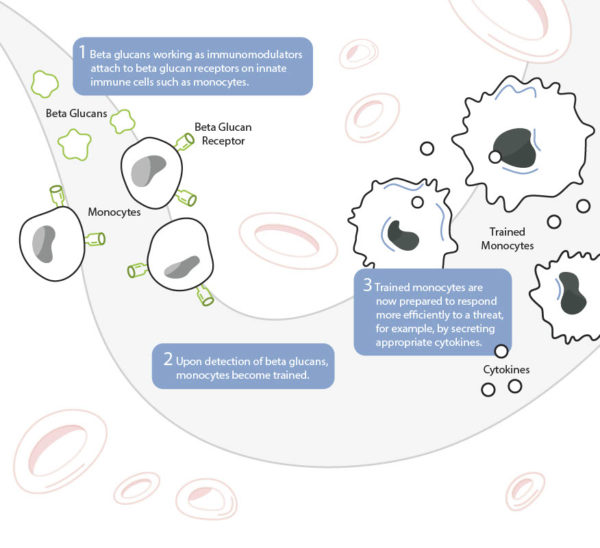What is an Immunomodulator, and How Does it Help Support Immunity?

Immunomodulators and their effects on immunity is a topic at the forefront of growing research on how yeast beta glucans can support immune health. Join Sonja Nodland, principal scientist for Wellmune®, in a Q&A on immunomodulators and the latest insights into how they influence immune health.
Q: Tell us a bit about your background, and why immune health is important to you.
A: I have a master’s degree in Cell Biology from Washington University in St. Louis and a PhD from the Microbiology, Immunology and Cancer Biology program at the University of Minnesota. My academic research was spent studying how various types of immune cells (mostly B cells and neutrophils) are “born” and develop normal function in the human body. Since that time, my scientific interests have expanded to include macrophages as well as how our immune system is influenced by our diet and the microorganisms present in our bodies.
One theme running through all these topics is that a healthy immune system is critical for general physical health and we are discovering that it may contribute to mental health as well. Because of this central role that immune health plays in our overall health and quality of life, it is a topic that interests me a great deal.
Q: What are immunomodulators?
A: Immunomodulators are substances that can help support immune function by modifying, generally in a beneficial way, the immune system’s response to a threat.
Watch the video to see more about how beta glucans work to support the immune system.
Q: How do they work to support immunity?
A: The first time you encounter a pathogen, the immune system initially responds in a rapid and non-specific way through its innate immune function. The symptoms associated with this response, things like pain and swelling, are a result of the body’s inflammatory response.
This is followed by a slower, specific response to the pathogen executed by the adaptive side of the immune system. The adaptive immune system is the part of the immune system that has long-term memory and prevents many pathogens from infecting us more than once.
Immunomodulatory molecules, some of which can be consumed through the diet, can help the body defend against pathogens by adjusting the normal immune response to respond more effectively when a pathogen has been detected.
Q: How does yeast beta glucan work as an immunomodulator?
A: Specific types of yeast-derived beta glucans affect the inflammatory and antimicrobial activities of neutrophils and macrophages, cells that are part of the innate immune system. There is emerging evidence that yeast beta glucans may “train” the body’s immune cells to react more effectively when a pathogen is detected.
Q: What does “train the body’s immune system” mean?
A: Training the body’s immune system refers to a newly recognized phenomenon that occurs when innate immune cells encounter specific pieces of microbes (living or non-living), causing the cells to adopt a more effective response to a future threat. In essence, this means that innate immune cells, after experiencing one of these training stimuli, retain a “memory” of the experience that allows them to respond more quickly and effectively when they encounter another pathogen.
Q: How is innate immune training different from traditional immune memory?
A: A key difference between innate immune training and the traditional immune memory is how broad the trained response is. In traditional immune memory, the immune system encounters a pathogen (for example, measles) through illness or vaccination and the adaptive immune system creates several types of specific molecules to recognize that pathogen (measles) in the future and block the body from becoming infected.
By contrast, in trained immunity, the innate immune system’s encounter with living or non-living microbes (the “trainer” stimuli) adjusts the innate immune response to allow for a more efficient reaction toward pathogens that are not related to the “trainer.” This more general effect is essential for immune defense because it is helpful to have some level of protection from pathogens you’ve never encountered before.
Trained immunity, induced by an initial encounter with a training stimulus such as yeast beta glucan, results in an enhanced response to subsequent infections. Several different functions of immune cells are primed for a quicker activation from this process including the production of antimicrobial molecules.
This illustration shows what happens when the immune system is “trained” as an immunomodulator.

Q: Does Wellmune®, a leading natural yeast beta glucan, facilitate innate immune training to support immune health?
A: As previously mentioned, the last decade has seen emerging evidence that yeast beta glucan could be a training stimulus for the immune system. Although this is not yet a scientific fact, the current evidence points in that direction. Additionally, some observations from previously published studies investigating the mechanism of action of Wellmune are consistent with how an innate immune trainer acts. This is an active area of research among those who work on innate immune training and I expect we will know much more in the next couple of years. In the meantime, the clinical research portfolio for Wellmune is good evidence of its immunomodulatory properties.
Q: Are there different types of yeast beta glucans? What’s the difference in how they support immune health?
A: Research supports the immune-modulating properties of yeast beta glucan—but not all yeast beta glucan from the species Saccharomyces cerevisiae are the same. Baker’s yeast and brewer’s yeast are two strains of Saccharomyces cerevisiae that both produce beta 1,3/1,6 glucans, but the beta glucans extracted from the cell walls of baker’s yeast have a different molecular structure from that extracted from brewer’s yeast.
Additionally, the purification process can affect the structure of the yeast beta glucan. Since it is well documented in scientific papers that molecular structure influences the beta glucan’s immune-modulating properties, the source of the beta glucan matters. Because of this, it’s important to consider research specifically conducted with the beta glucan of interest. Research results from studies using specific baker’s yeast-derived beta glucans cannot be attributed to any other type of yeast-derived beta glucan, such as brewer’s yeast, or baker’s yeast beta glucans purified with different manufacturing processes.
Q: How do I choose an efficacious yeast beta glucan ingredient?
A: When choosing an immune health ingredient, your focus should be on the quality of the ingredient. Quality comes down to how well-substantiated the benefits are. Over a dozen human clinical trials have been published on Wellmune, demonstrating its efficacy in supporting the human immune system. Wellmune has been shown to help improve general immune health and maintain overall health. Wellmune can also help protect against the harmful effects of stress and promote healthy energy levels and mental clarity.

